U.S. failed to assert itself against more proactive, opportunistic Mexico

The entertainment of Mexico and the United States’ match for a spot in the 2017 FIFA Confederations Cup couldn’t hide both teams’ tactical deficiencies. Neither entered the game in an ideal situation, but Mexico seemed just slightly better-prepared for the one-off playoff, winning 3-2 in extra time.
While United States manager Jurgen Klinsmann settled into the reactive posture the Americans have displayed on the world stage for some time in the CONCACAF Cup playoff on Saturday, Mexico interim coach Ricardo Ferretti did the opposite. His bold and attack-minded lineup, featuring three center forwards and no true wingers, showed no fear as Juan Carlos Osorio would be taking over from him soon, regardless of the result.
That result was a win in which El Tri attacked from the first whistle and, at least in the top half of the field, looked largely comfortable. The U.S. displayed the same spirit that impressed fans worldwide at the World Cup, coming back from two one-goal deficits to tie, but the Americans hardly ever imposed themselves on the game.
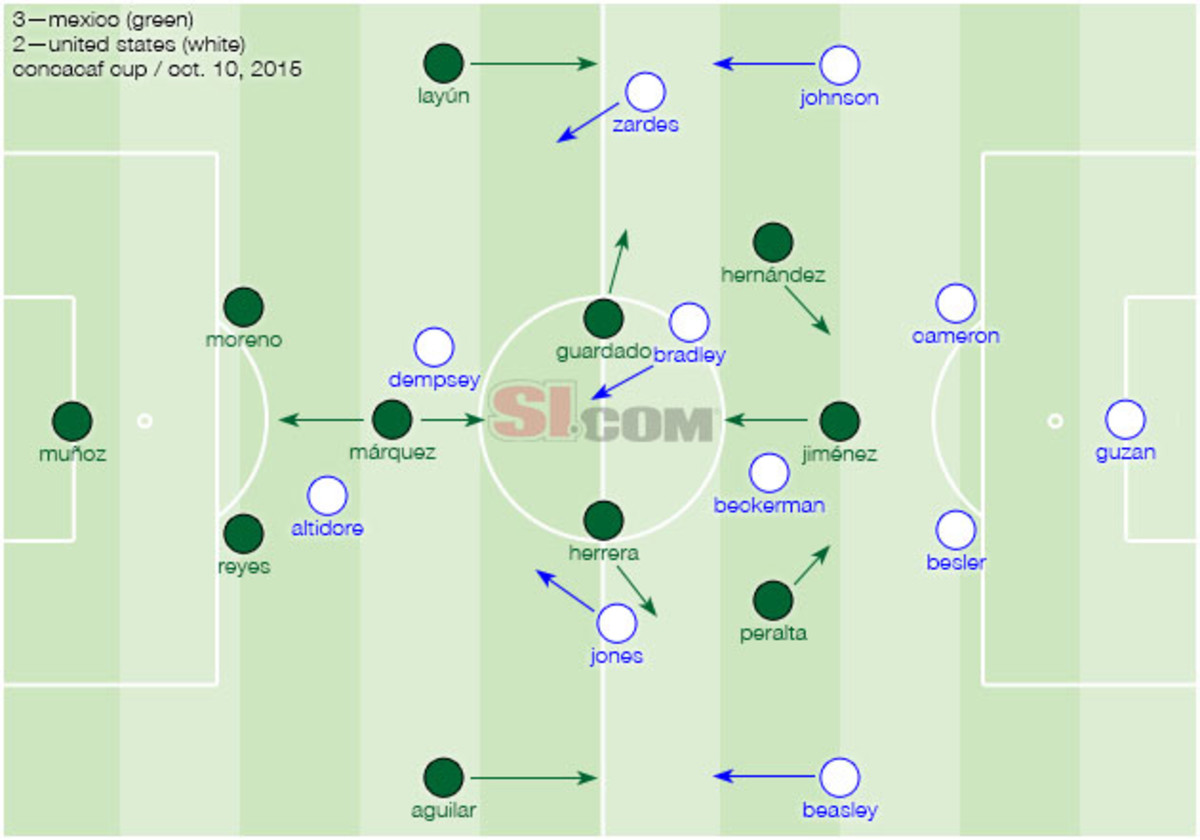
The U.S. lined up in a narrow 4-4-2 with Michael Bradley reprising his usual free role ahead of Kyle Beckerman. Clint Dempsey drifted between the midfield and target man Jozy Altidore, linking the lines with mixed results, though his hold-up play improved in the second half.
In loss to Mexico, U.S. beaten by the very skill it aspires to match
Meanwhile, Mexico flowed between a 5-3-2 and 4-3-3, with Rafa Márquez playing between the back line and midfield. Ahead of him, Andrés Guardado and Hector Herrera covered a large amount of ground as dictated by the absence of José Juan Vázquez in the holding role. Raúl Jiménez shuttled between the higher lines, while Javier Hernández and Oribe Peralta stayed either side of him and acted as a traditional two-forward set.
The three-on-two matchup between U.S. center backs Geoff Cameron and Matt Besler and Mexico’s narrow forwards troubled the defenders all night. El Tri’s ability to match or outnumber the U.S. in the attacking third paid off early, as Mexico scored the first goal of the game in the 10th minute.
Besler and Beckerman both stepped to pressure Peralta’s dummy run, which took two defenders out of the play without even a touch of the ball and left Jiménez one-on-one with Cameron. Bradley’s higher starting position allowed Hernández to make an unmarked trailing run into the attack as Peralta received the return pass.
After Mexico loss, it's time to consider Klinsmann's suitability as U.S. coach
With the back line stretched, Fabian Johnson didn’t recognize the open space quickly enough and was too far away to effectively cover Cameron. Peralta blew past a ball-watching Besler, giving Mexico a two-on-one running at Brad Guzan’s goal that Hernández finished with ease after the quick combination.
Immediately upon his team taking the lead, Márquez withdrew farther between the center backs and advanced from a deeper position.
However, the U.S. equalized quickly, exploiting the width in Mexico’s narrow shape to win a free kick on the left flank.
Bradley perfectly weighted his service onto Cameron’s forehead after DaMarcus Beasley won the set piece. The play left the Mexican players staring at goalkeeper Moisés Muñoz in disbelief of their disorganized defense, which would be a frequent theme whenever the U.S. attacked.
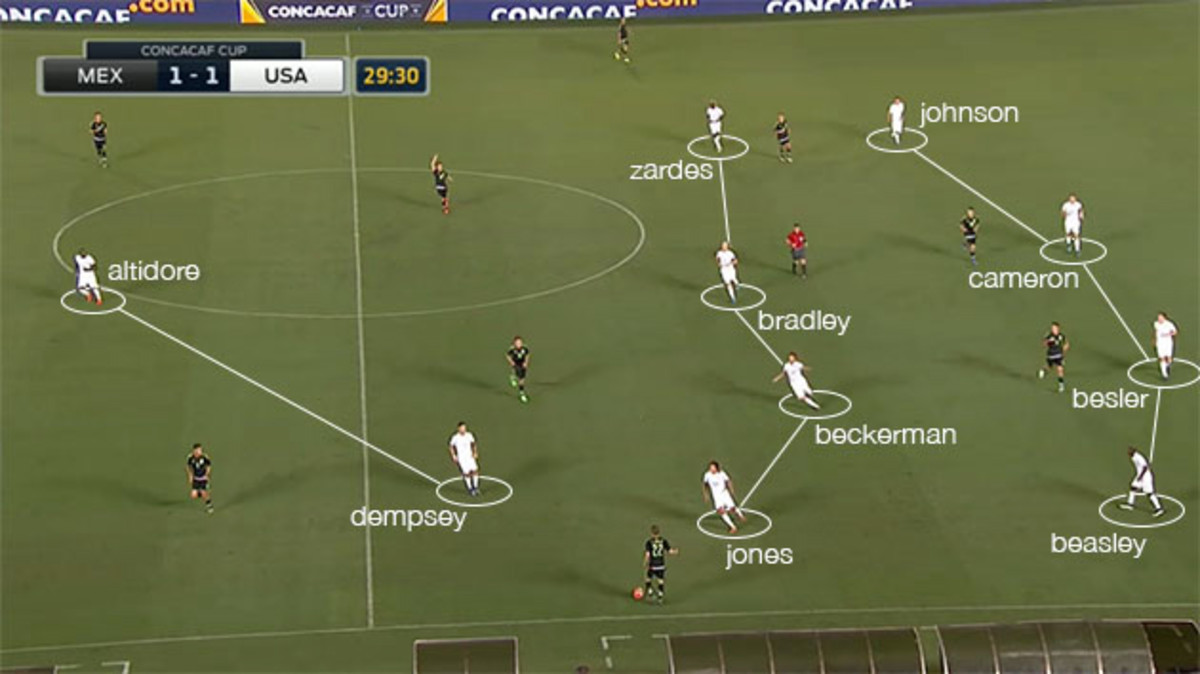
On the opposite end, Bradley dropped next to Beckerman defensively to reduce the available space for Mexico’s forwards. Bradley, in another match that saw him cover an extraordinary amount of ground, also unbalanced Mexico’s defense with late runs from that deeper position.
Mexico’s forwards were either unwilling or unassigned to do the defensive work usually assigned to wingers, leaving the wingbacks and central midfielders to defend in wide spaces. As such, the U.S.’s most dangerous looks came from play initiated either on the flank or in the half-spaces just outside the central-most channel.
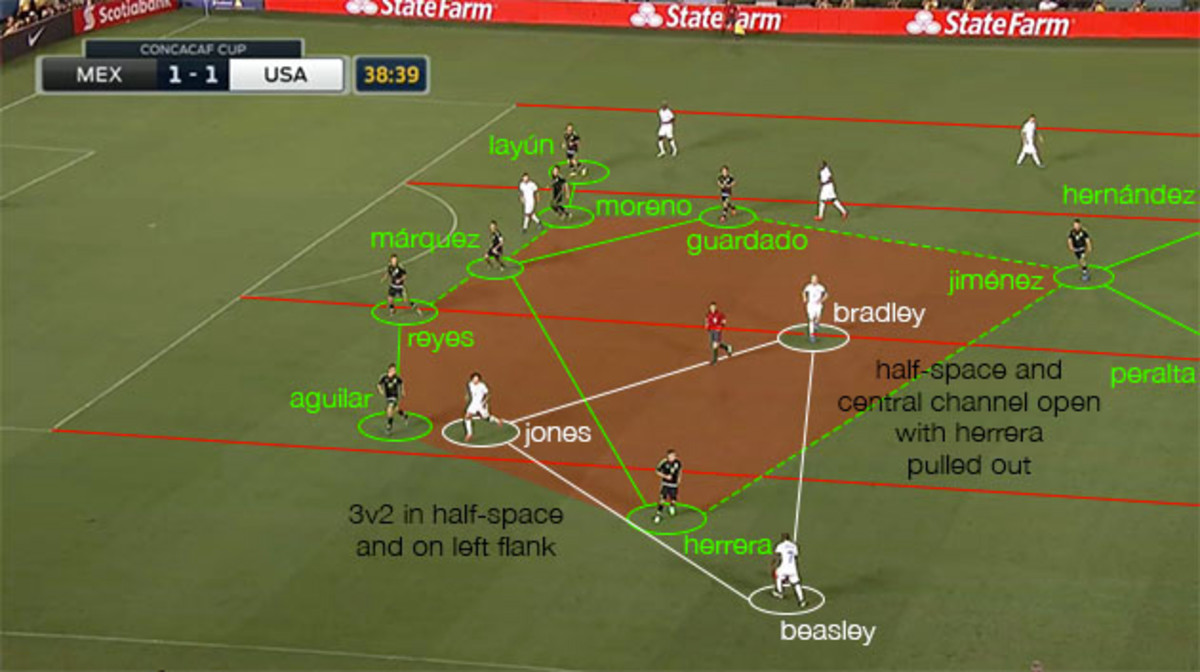
The U.S. failed to capitalize on its wide advantage besides winning the free kick that led to the first goal, and it caused no confusion in Mexico’s back line with decisive runs from the forwards. Beasley swung a couple crosses into the penalty area that Altidore nearly finished, but the play remained too one-dimensional and couldn’t induce any fatal mistakes from Mexico’s shaky center backs.
The U.S. attacked less frequently as Mexico continued to threaten in the second half. The Americans looked progressively more tired from chasing the game, conceding possession and space to El Tri while also making the mental errors that come with physical exhaustion.
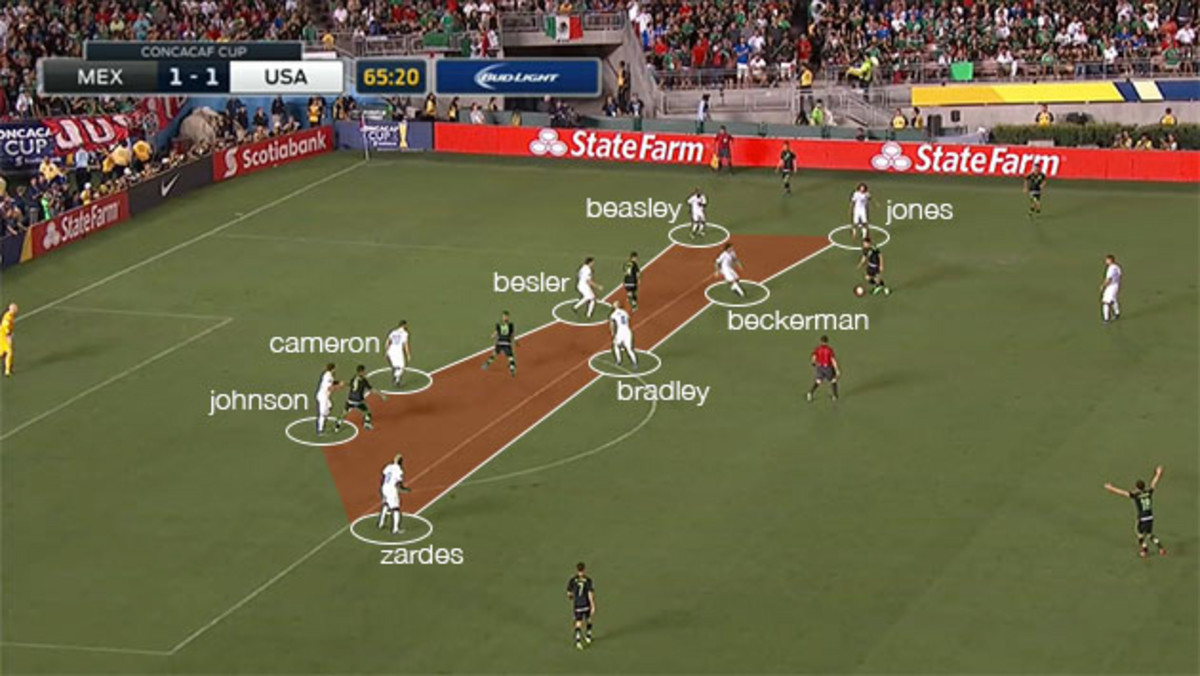
The American wingers almost looked like second fullbacks as they stayed closer to their defensive partner on their side. The U.S. maintained strict vertical compactness between defense and midfield, but it often left too much space in front without the forwards also dropping back to close the gap between lines.
As the wide men collapsed, horizontal compactness between the wingers and central midfielders suffered, and Mexico circulated the ball at will in front of Bradley and Beckerman. Herrera and Guardado had time to pick their passes to the forwards checking into space or the wingbacks running in behind.
The U.S. also held too high of a line considering the lack of pressure on Mexico’s creative midfielders. The American midfielders continued to drop, while the defenders stepped up to leave spaces gaping behind them.
On Mexico’s first goal in extra time, Guardado had time to lift a pass toward Paul Aguilar as the advancing wingback ran behind Jones and Beasley. Jones and the back line dropped hard to close down Aguilar before he could control the ball, but the other midfielders didn’t follow and, again, Johnson left too much space between himself and Cameron.
Without the midfielders tracking back, the U.S.’s vertical compactness disappeared. Aguilar scuffed his cross, but Peralta still had time to adjust his run and finish past Guzan because Cameron had no defensive support.
Klinsmann throws Johnson under bus ahead of friendly against Costa Rica
The U.S. scrambled to tie the game again as substitute forward Bobby Wood provided the first challenging run Mexico’s central defenders had seen all night, cutting across the back line before finishing well across his body.
In effect, it was the same problem that just doomed the U.S. on the opposite end, as DeAndre Yedlin was under little pressure and had time to weight his pass perfectly.
The final result came not from Mexico playing its best, but the U.S. being unwilling to take the game to its opponent’s back line in the same manner that El Tri did. Mexico showed plenty of defensive deficiencies on Saturday and the three center forwards were only sporadically dangerous, but the U.S. seemed to prefer absorbing attacks to going forward.
It’s not that the U.S. parked the bus; it was probably the prudent choice against a Mexican team that looked stronger on paper than almost every American player. But if a team decides to play defensively (or in any fashion), each player has to be on the same page and execute his role.
That lack of understanding, and Aguilar’s golazo in the dying moments of extra time, slammed the door on the Americans’ hopes of competing in the Confederations Cup. The U.S. reacted meekly to its opponent’s style and tactical changes rather than imposing its own, and Mexico grabbed its opportunities when they came.
GALLERY: USA vs. Mexico through the years
USA vs. Mexico Soccer
November 11, 2016 – Mexico 2, USA 1
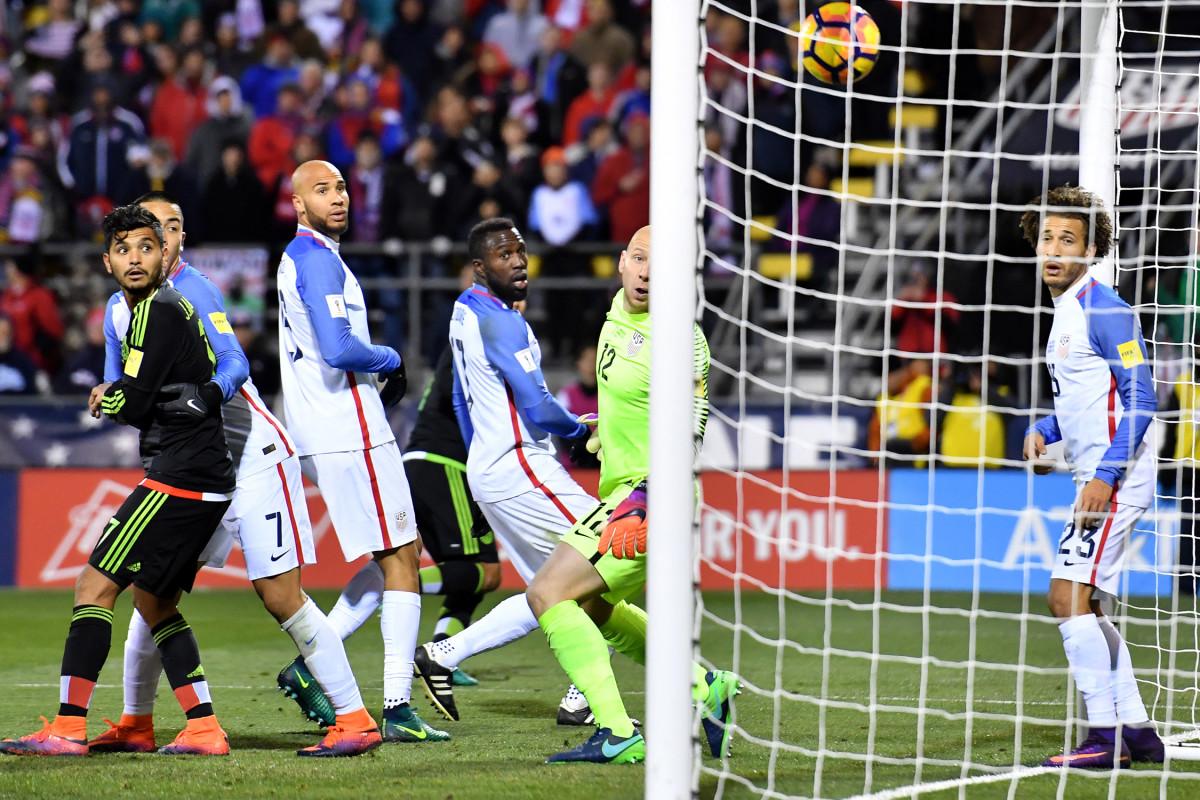
USA and Mexico players watch Rafa Marquez's 89th-minute header find the net in a famous World Cup qualifying win in Columbus for El Tri.
October 10, 2015 – Mexico 3, USA 2 (AET)
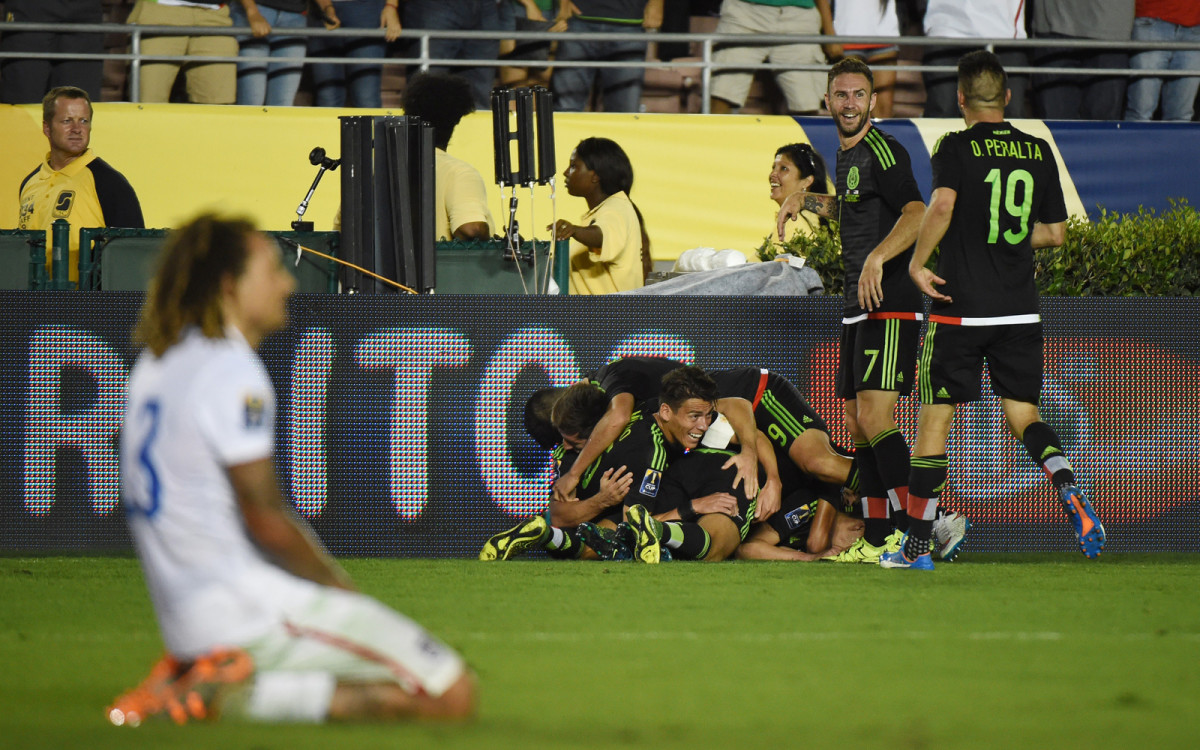
Jermaine Jones falls to his knees in disappointment as Mexico celebrates after Paul Aguilar's sensational volley in extra time captured the CONCACAF Cup for El Tri and sends the U.S. rival to the 2017 FIFA Confederations Cup.
April 15, 2015 — USA 2, Mexico 0
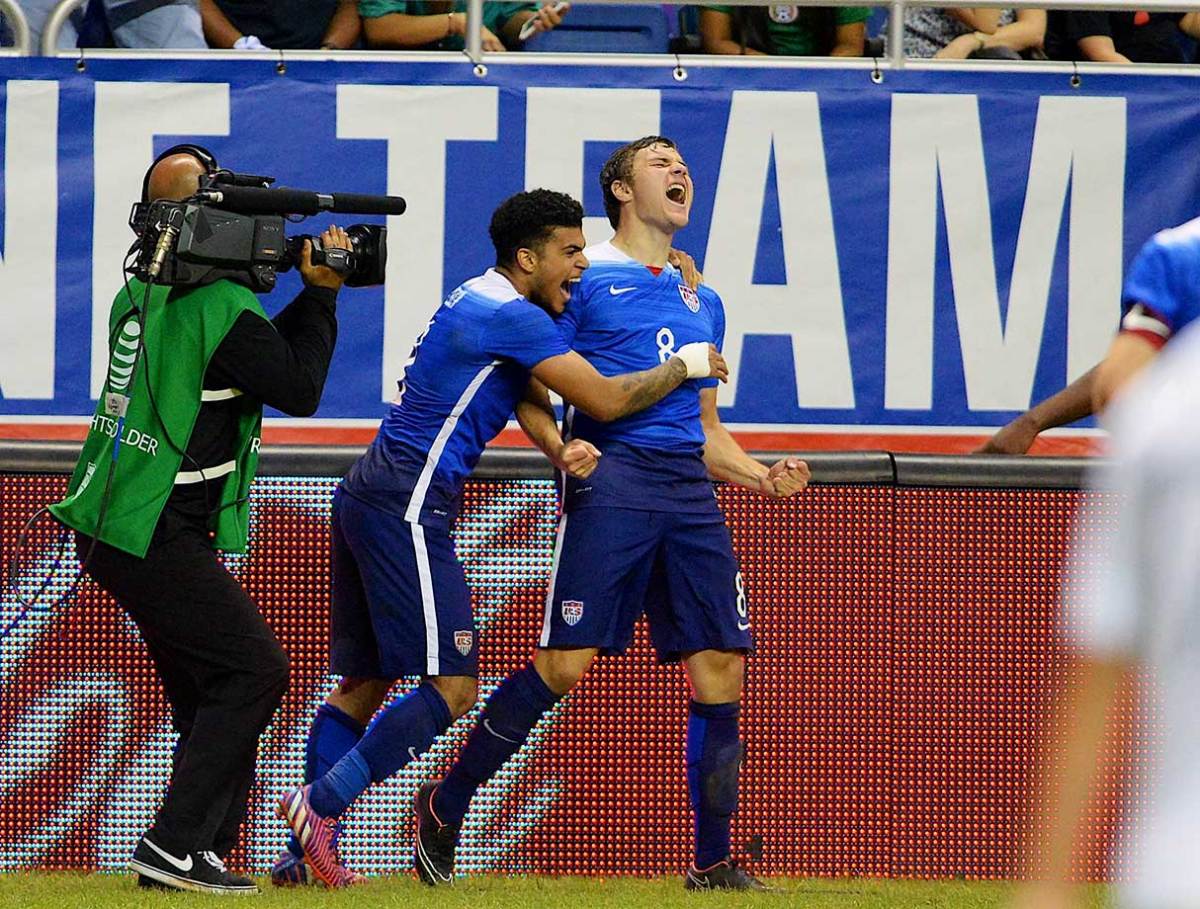
Stanford University's Jordan Morris marked his first senior national team start with his first international goal, sparking the USA in another 2-0 triumph over Mexico, this one at the Alamodome in San Antonio.
September 10, 2013 — USA 2, Mexico 0
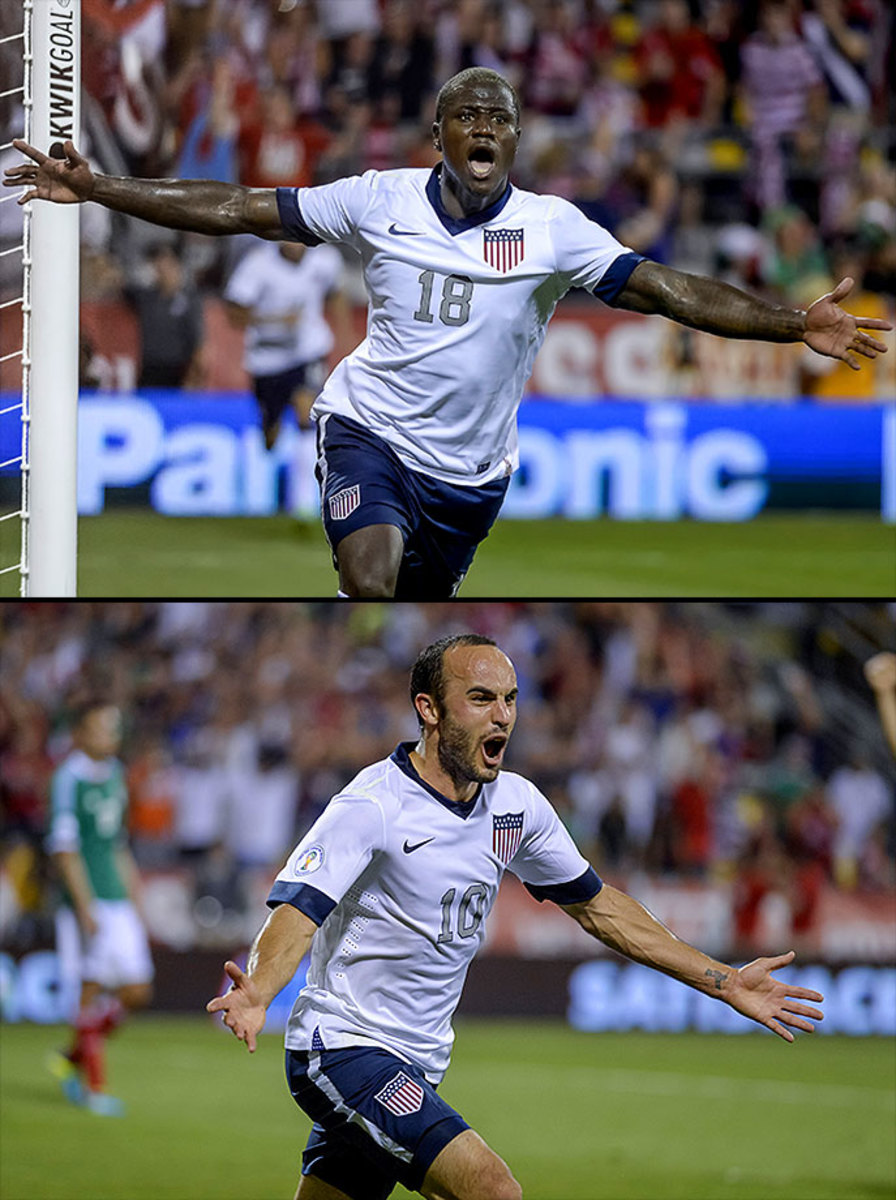
Eddie Johnson and Landon Donovan scored second-half goals to beat El Tri by the same score for the fourth consecutive qualifier in Columbus, Ohio.
March 26, 2013 — USA 0, Mexico 0
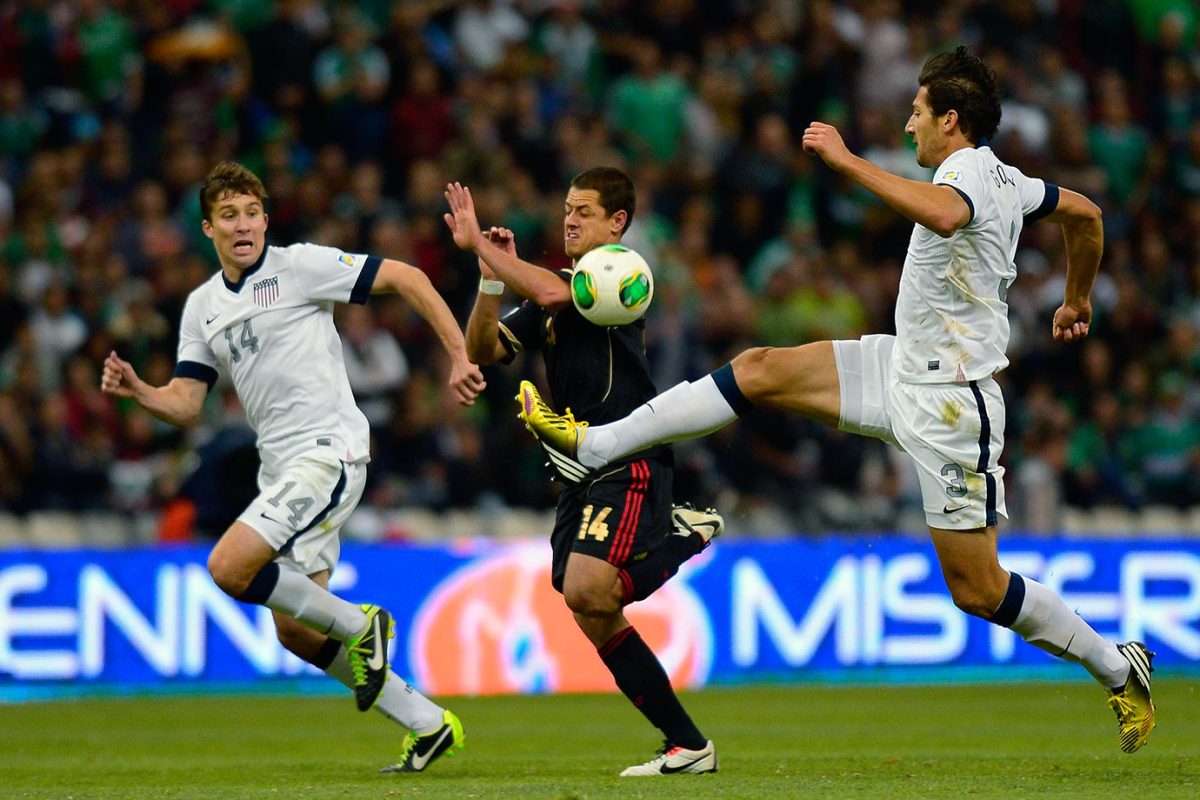
Clint Dempsey captained the U.S. to a 0-0 draw at Estadio Azteca, the second time ever the Americans registered a point in World Cup qualifying in Mexico (the other a 1997 tie). Defenders Omar Gonzalez and Matt Besler were the stars as Mexico couldn't cash in on several opportunities. The U.S. escaped to remain in second place in CONCACAF qualifying.
August 15, 2012 — USA 1, Mexico 0
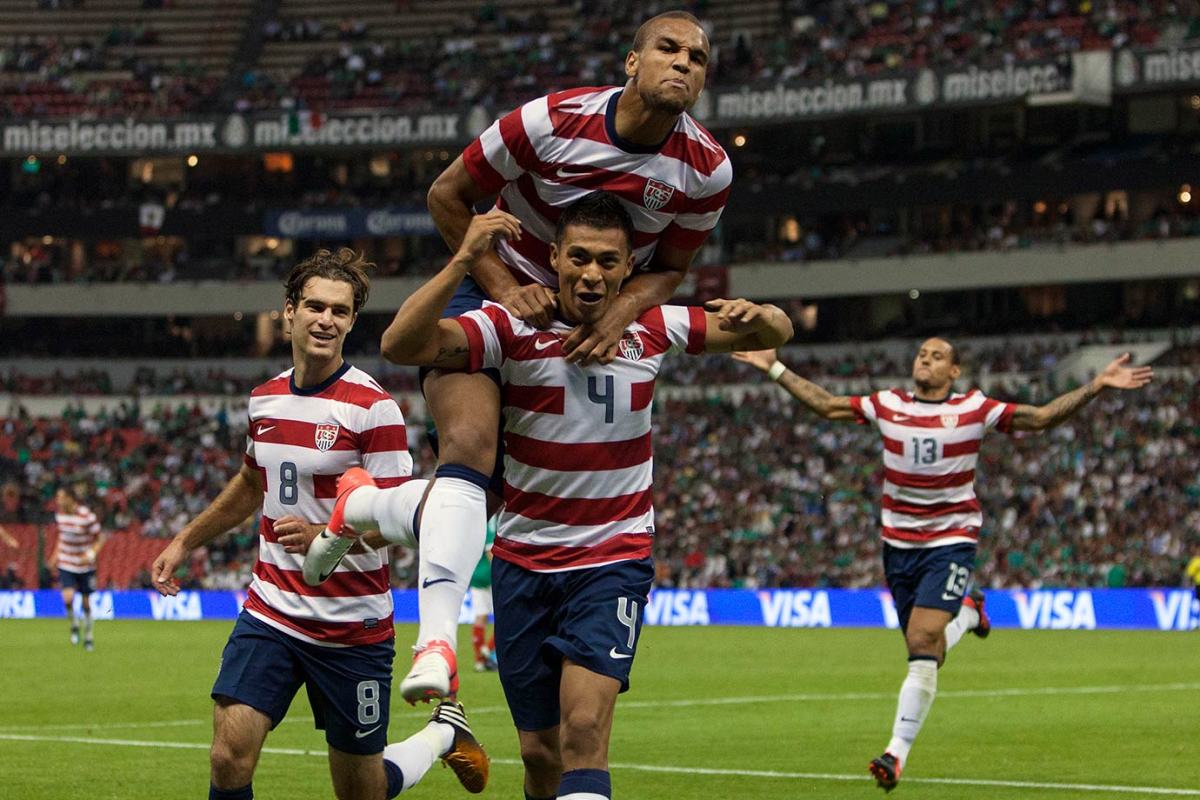
It took 25 attempts, but after this friendly, the United States could finally say that it had won at Mexico City's Azteca Stadium. Despite being outplayed for most of the match, the U.S. won thanks to an 80th-minute goal from Michael Orozco Fiscal — the first international goal of his career.
August 10, 2011 — USA 1, Mexico 1
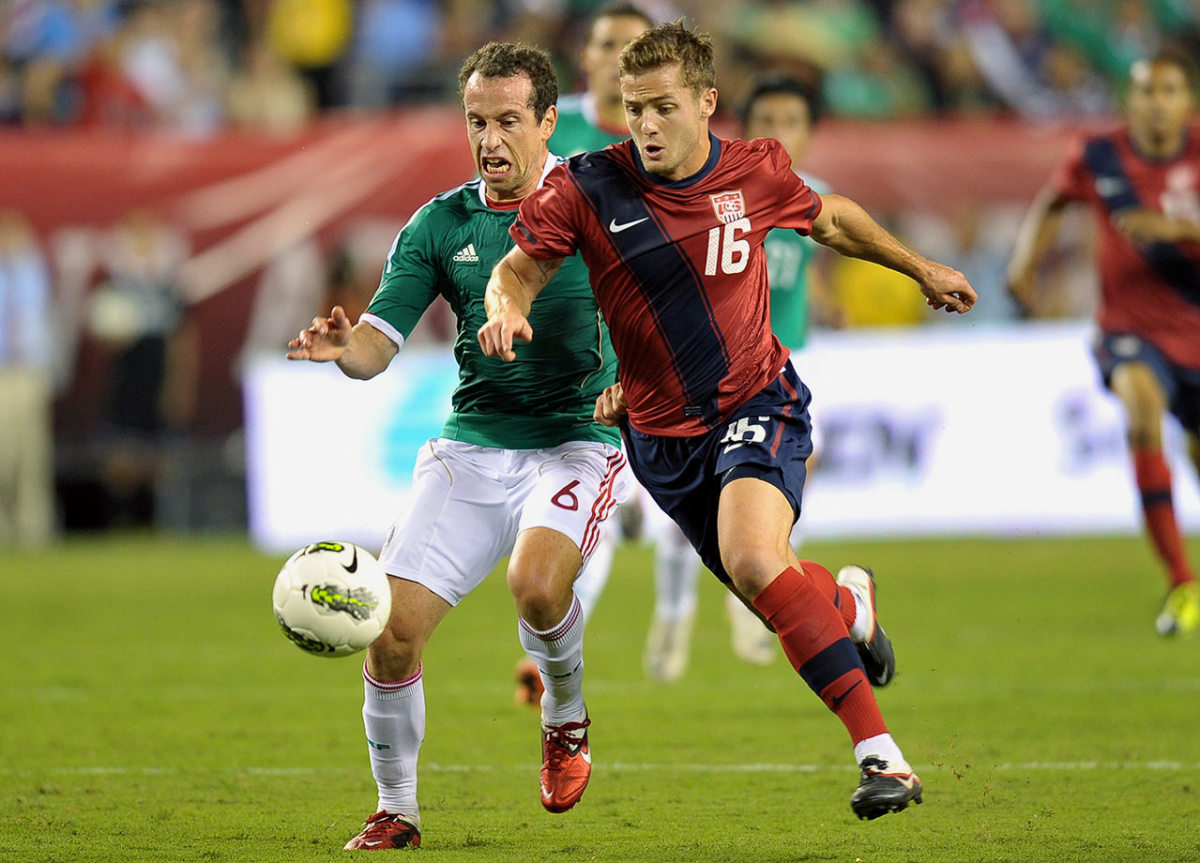
Head coach Jurgen Klinsmann's U.S. debut got off to a rough start, as the Americans trailed Mexico, 1-0 after an uninspired first half in Philadelphia. The U.S. showed more verve after halftime, though, and an impressive display from Brek Shea and a 73rd-minute goal from Robbie Rogers led to a 1-1 draw.
June 25, 2011 — Mexico 4, USA 2
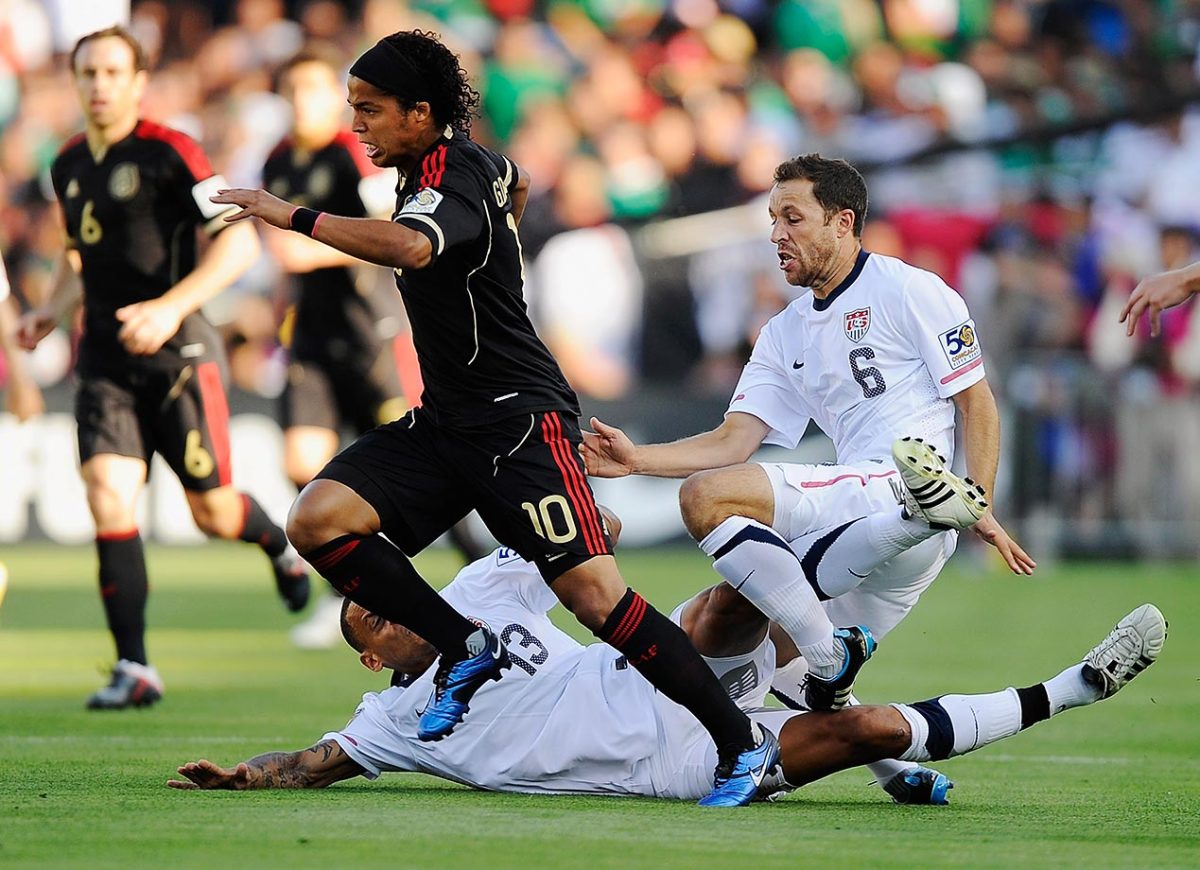
In the Gold Cup final, Mexico captured its second straight title in the battle for CONCACAF bragging rights and secured a berth in the 2013 Confederations Cup. Pablo Barrera scored twice; Giovani Dos Santos and Andres Guardado also had goals. The U.S. was up 2-0 early on Michael Bradley and Landon Donovan goals, but poor defending (partially due to the loss of Steve Cherundolo by injury) doomed the Americans.
August 12, 2009 — Mexico 2, USA 1
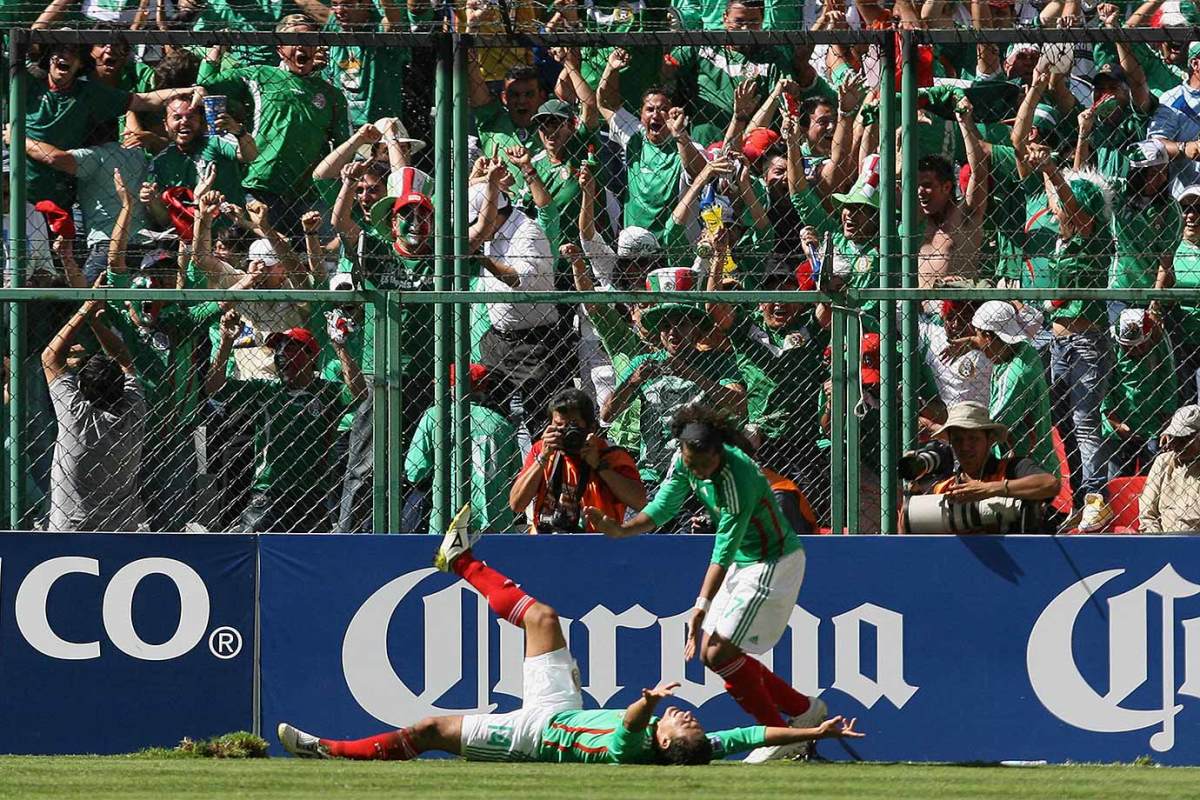
The U.S. took its first-ever lead at Azteca Stadium, but went on to lose 2-1 in what was a critical World Cup qualifier for Mexico. The win changed the tide for the then-struggling Mexican squad, as it went on to go 3-0-1 in its next four matches to earn a trip to South Africa. The U.S. still went on to finish first in CONCACAF qualification.
July 26, 2009 — Mexico 5, USA 0
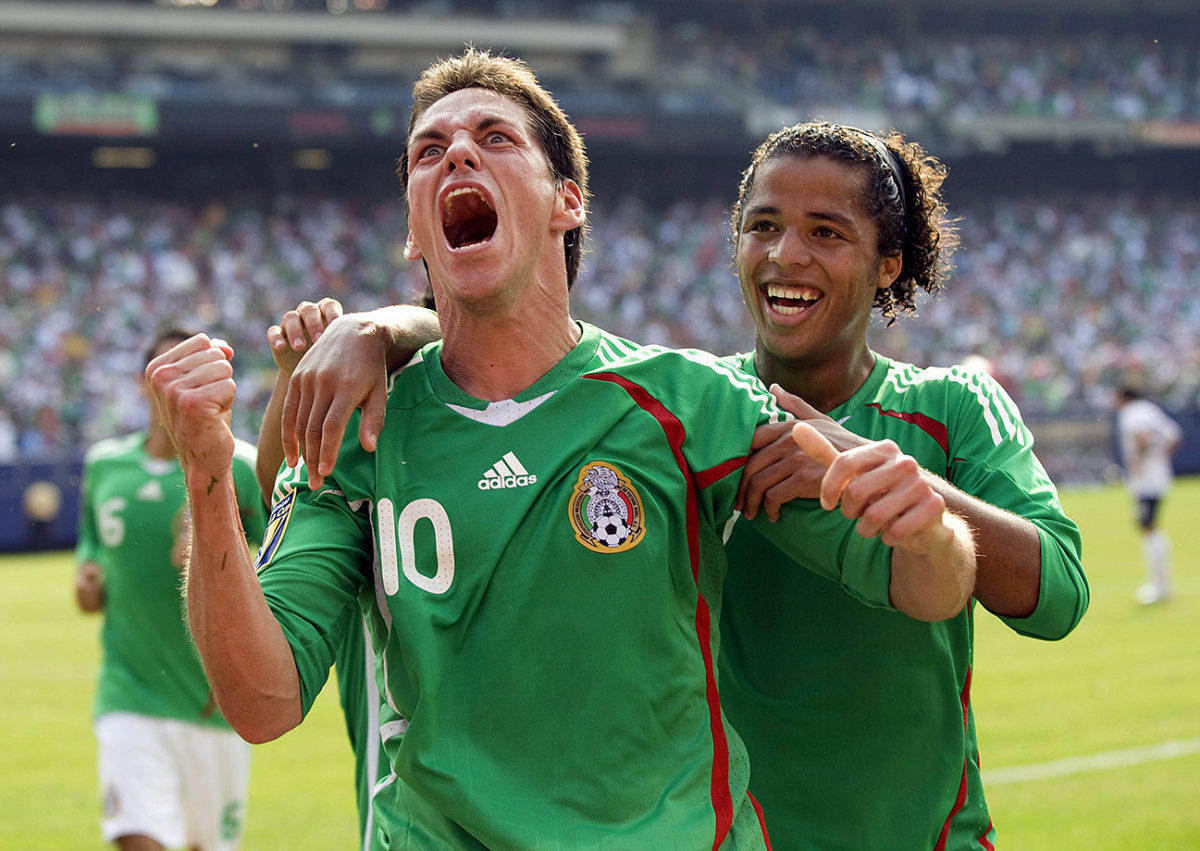
Mexico put an emphatic end to the Americans' 9-0-2 home streak against "El Tri." The Mexicans took the Gold Cup from the two-time defending champion, with five different players scoring goals in the second half at Giants Stadium.
February 11, 2009 — USA 2, Mexico 0
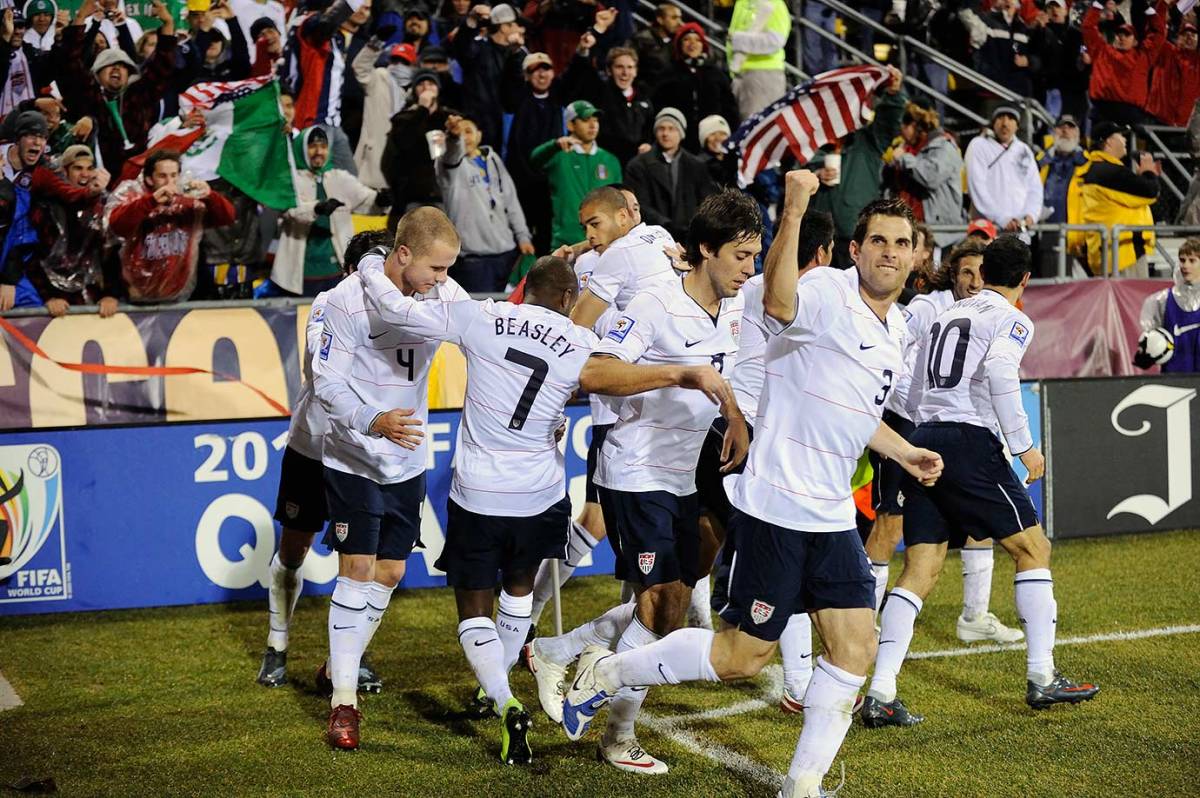
Two goals from Michael Bradley gave the U.S. another home victory over Mexico. It marked the eleventh consecutive time that the Americans had gone unbeaten against Mexico when playing on U.S. soil.
June 24, 2007 — USA 2, Mexico 1
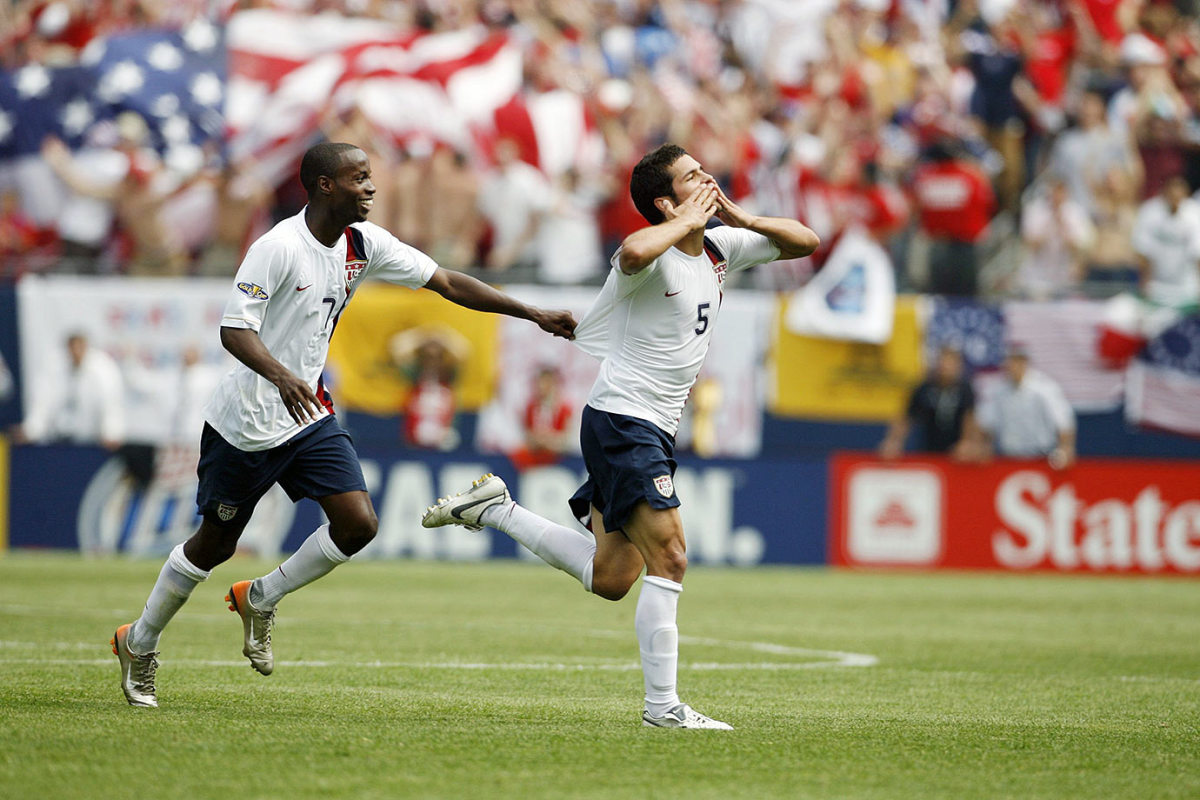
Down 1-0, second-half goals from Landon Donovan and Benny Feilhaber gave the U.S. the victory in the 2007 Gold Cup finals. The win earned the Americans a spot in the 2009 Confederations Cup, where they achieved their famous upset over Spain.
September 3, 2005 — USA 2, Mexico 0
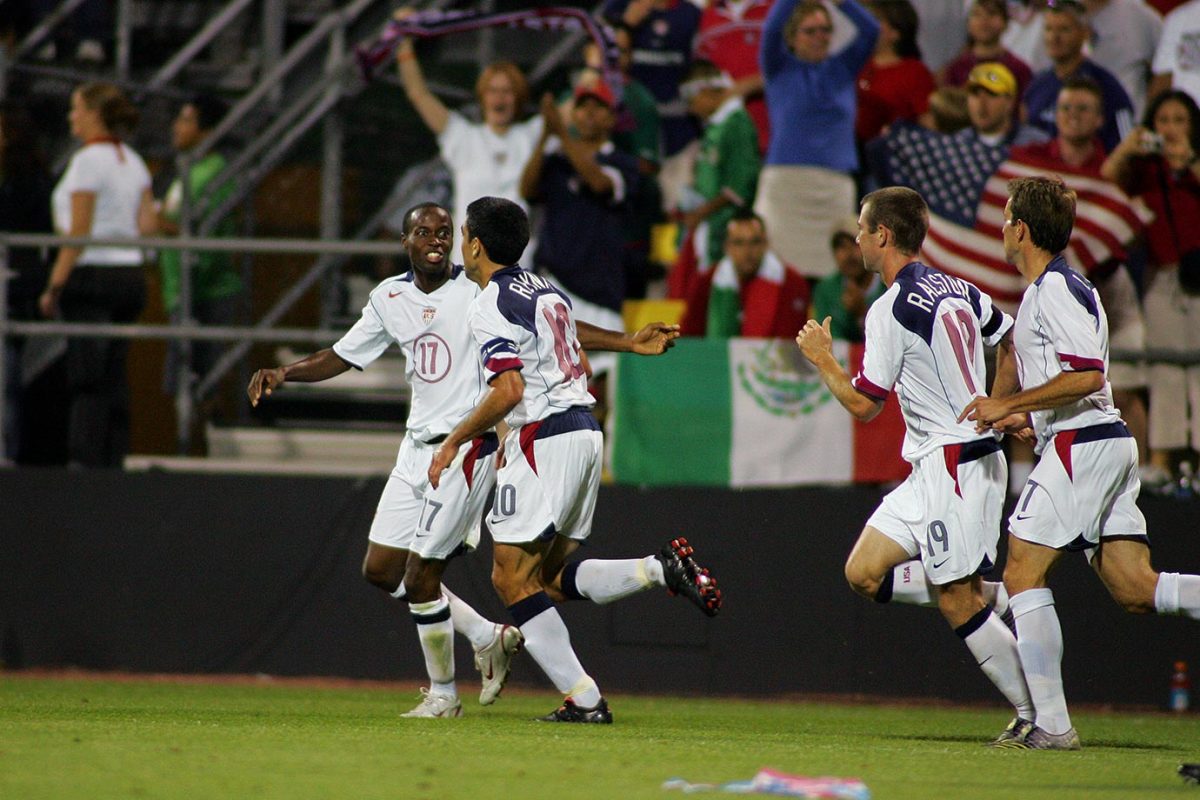
A 2-0 victory over "El Tri" clinched a spot in the 2006 World Cup, with goals coming from Steve Ralston and DaMarcus Beasley.
May 8, 2003 — USA 0, Mexico 0
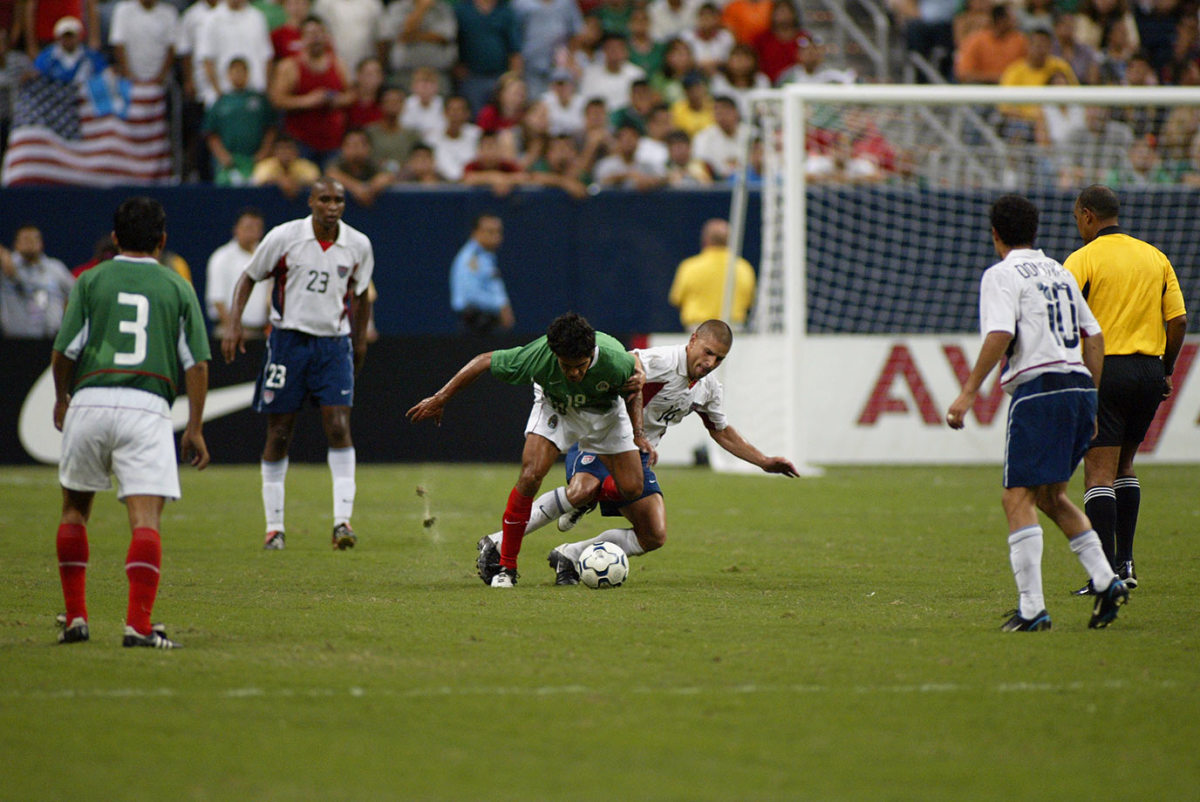
In their first meeting since the 2002 World Cup, an all-MLS squad of Americans played Mexico to a 0-0 draw in front of more than 69,000 people in Houston.
June 17, 2002 — USA 2, Mexico 0
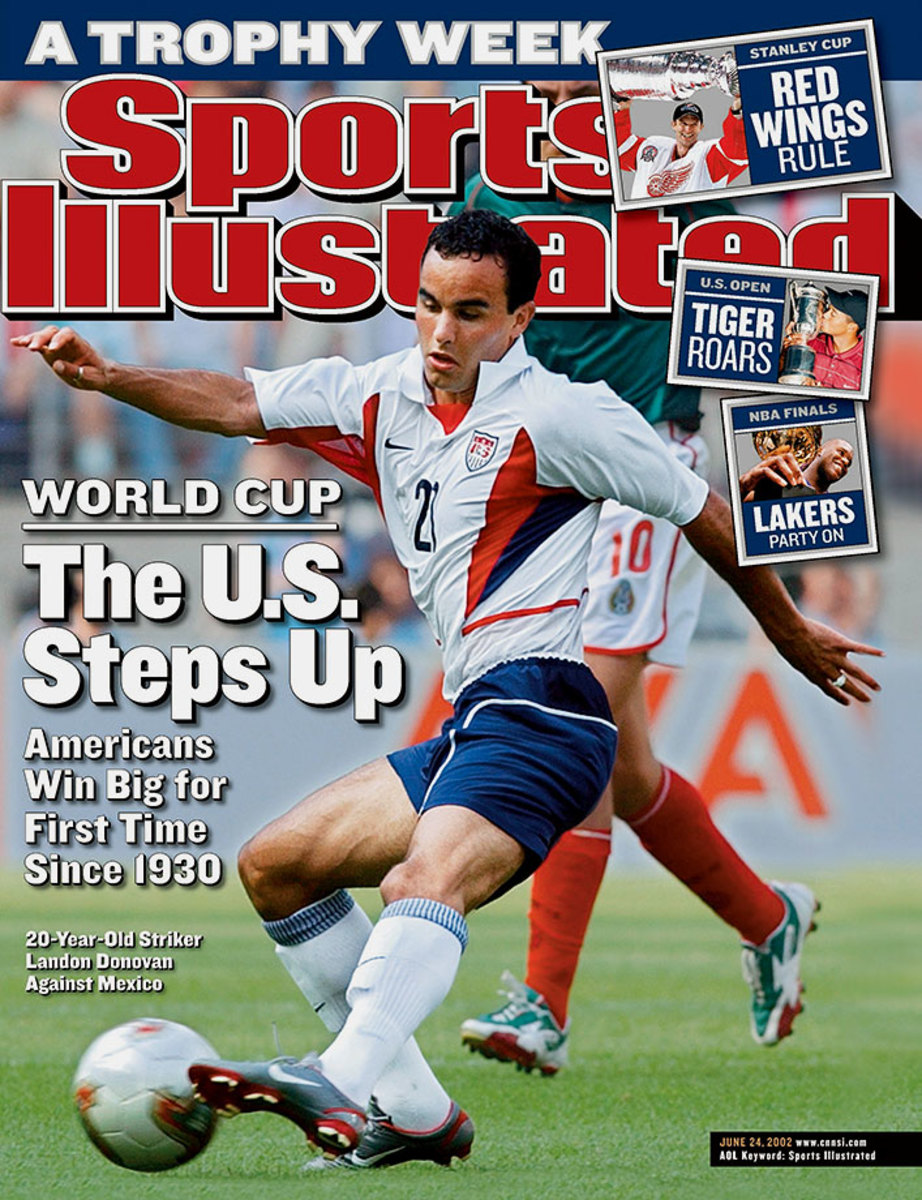
Arguably the biggest win in U.S. soccer team history came against its archrivals at the 2002 World Cup. Brian McBride and Landon Donovan gave the Americans a 2-0 victory in South Korea to send their team to the quarterfinals. It is the furthest stage the team has reached in the World Cup since 1930.
July 1, 2001 — Mexico 1, USA 0
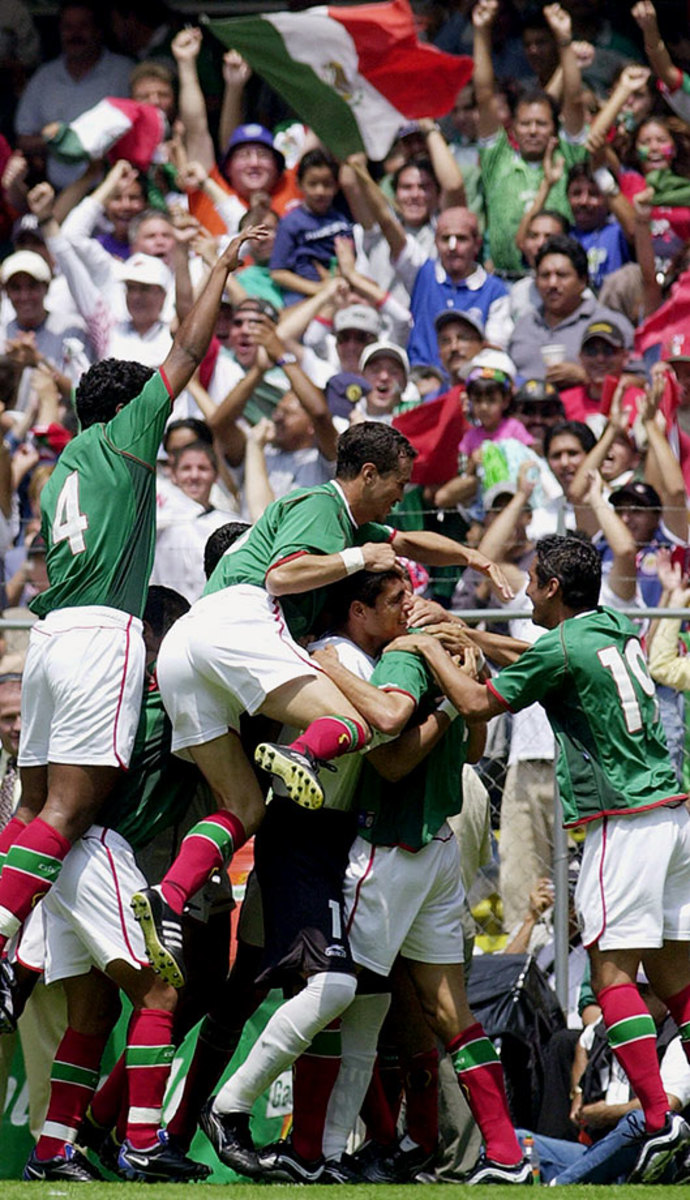
Needing a win to stay in contention for the 2002 World Cup, the Mexicans won 1-0 at Azteca Stadium, making their record 21-0-1 when hosting the Americans.
February 28, 2001 — USA 2, Mexico 0
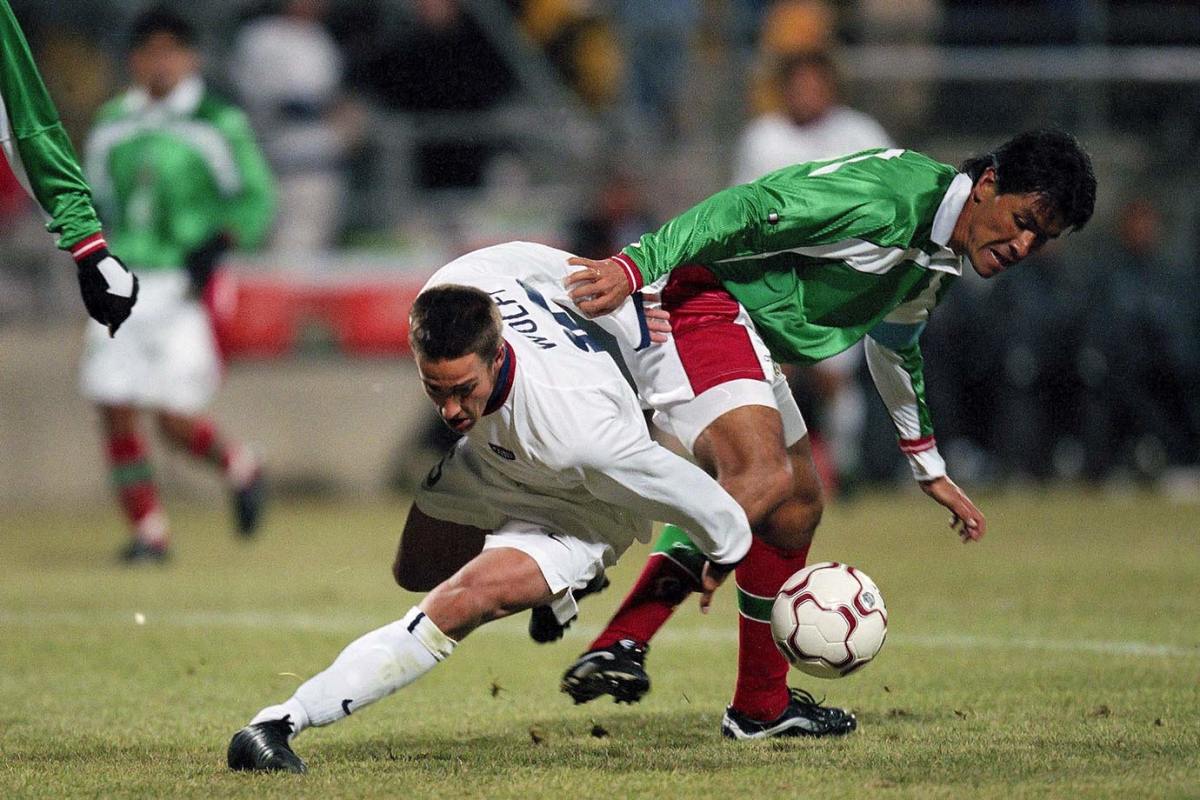
For the first time ever, the Americans won their third consecutive game against Mexico. The victory came in the World Cup qualifying finals and was held in Columbus, Ohio.
August 1, 1999 — Mexico 1, USA 0
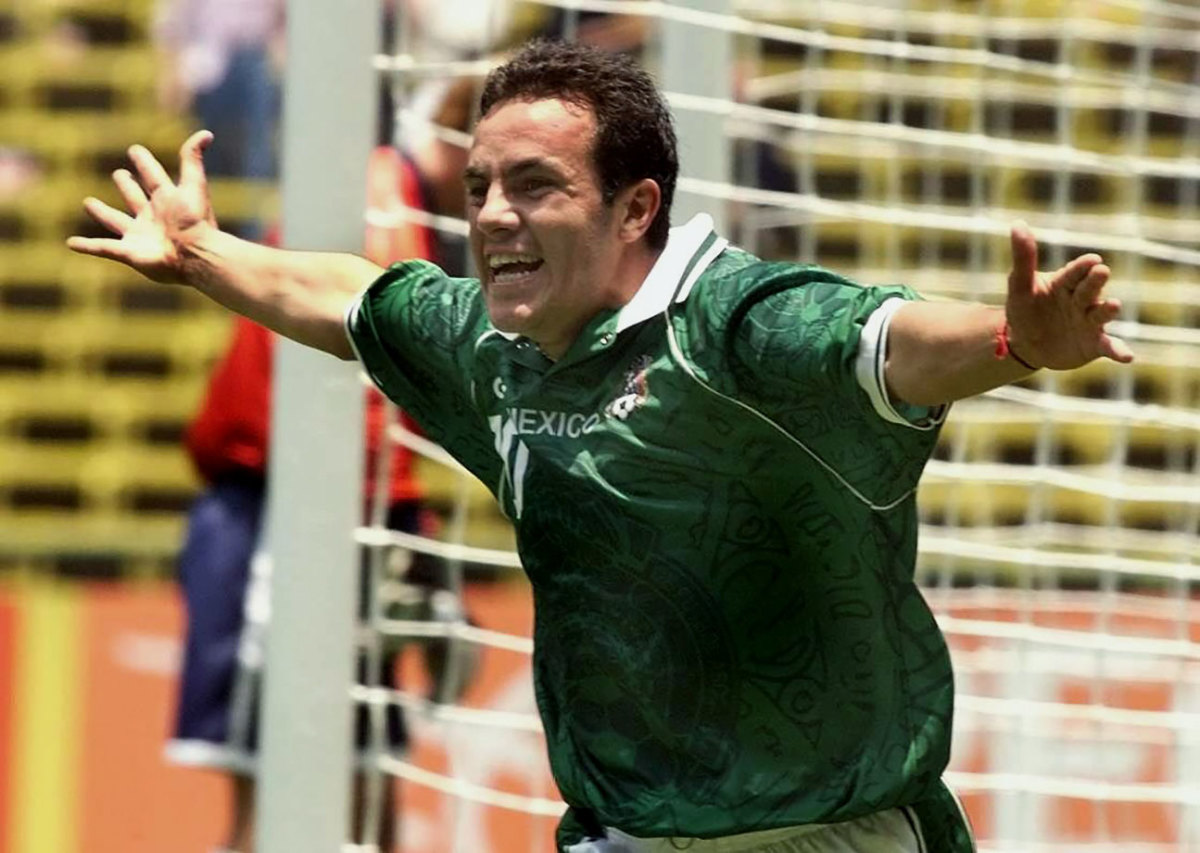
Cuauhtemoc Blanco's goal in extra time eliminated the U.S. in the semifinals of the 1999 Mexico City Confederations Cup. The win capped off a long tradition of Mexican dominance over the American side, a streak that shortly thereafter ended, as the Americans won the next three matches against their rivals.
July 17, 1995 — USA 0, Mexico 0
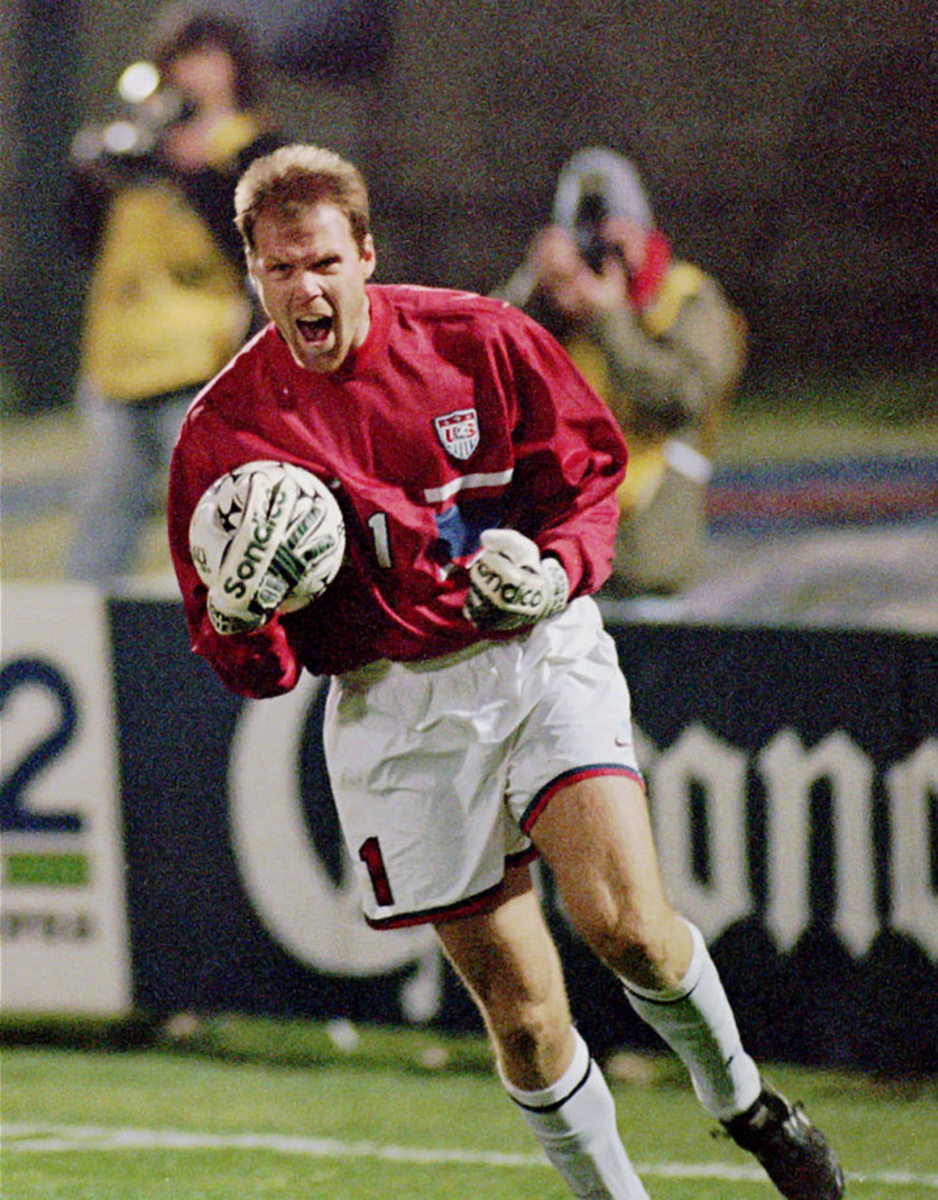
The USA outlasted Mexico in a penalty shootout to reach the semifinals of the 1995 Copa America. After a 0-0 draw, goalkeeper Brad Friedel was the hero in PKs, making two saves. The U.S. made all four of its attempts and advanced.
